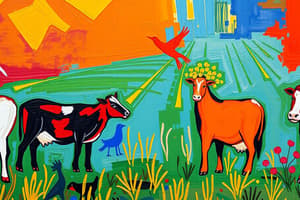Podcast
Questions and Answers
What happens in chapter 1?
What happens in chapter 1?
Major assembles animals in the barn and urges them to rebel.
What significant event occurs in chapter 2?
What significant event occurs in chapter 2?
Major dies and the pigs take charge because they're the smartest.
What happens in chapter 3 regarding the animals' work?
What happens in chapter 3 regarding the animals' work?
Animals finish harvest, with Boxer as the best worker, while the pigs supervise.
What does chapter 4 describe about other farms?
What does chapter 4 describe about other farms?
What conflict arises in chapter 5?
What conflict arises in chapter 5?
What key event occurs in chapter 6?
What key event occurs in chapter 6?
What struggles are highlighted in chapter 7?
What struggles are highlighted in chapter 7?
What changes occur in chapter 8 regarding the commandments?
What changes occur in chapter 8 regarding the commandments?
What significant developments happen in chapter 9?
What significant developments happen in chapter 9?
What is revealed in chapter 10 about the pigs?
What is revealed in chapter 10 about the pigs?
Flashcards are hidden until you start studying
Study Notes
Chapter 1
- Major, an elder pig, gathers the animals to inspire a rebellion against their human owner.
- He emphasizes the need for animal freedom and outlines the vision for a farm run by animals.
Chapter 2
- Following Major's death, the pigs assume leadership due to their intelligence.
- Snowball and Napoleon emerge as the primary leaders, leading the rebellion as animals face hunger.
- The farm is renamed from Manor Farm to Animal Farm; the 7 Commandments of Animalism are established.
Chapter 3
- The animals successfully complete the harvest, with Boxer recognized as the hardest worker.
- Pigs assume supervisory roles; Snowball and Napoleon often clash in debates during meetings.
- The slogan "Four legs good, two legs bad" is propagated, promoting animal unity.
- Pigs claim milk and apples for themselves, justified by Squealer's assertion of their essential role.
Chapter 4
- The news of the rebellion spreads, inspiring similar actions on neighboring farms.
- Humans attempt to reclaim the farm but are defeated in the Battle of the Cowshed, securing Animal Farm's independence.
Chapter 5
- Molly, a horse, leaves the farm, showing discontent with the new regime.
- Disagreements between Snowball and Napoleon intensify over the proposed windmill.
- After Snowball is ousted from the farm, Napoleon falsely portrays him as a traitor.
Chapter 6
- The animals toil harder for less food as they work on the windmill.
- Inter-farm trading begins, and pigs move into the farmhouse for comfort.
- The Fourth Commandment is altered to allow pigs to sleep in beds with sheets.
- A storm destroys the windmill, and Snowball is unjustly blamed, leading to a decision to rebuild.
Chapter 7
- The struggle to rebuild the windmill continues amidst food shortages.
- Napoleon engages in commerce by selling eggs to humans, inciting a rebellion among hens.
- Rations are cut as nine animals are executed under Napoleon’s orders; Snowball remains a scapegoat.
- The song “Beast of England” is banned, indicating the regime’s tightening control.
Chapter 8
- The updated commandment states no animal shall kill another without cause, reflecting shifting ethics.
- Napoleon opts to sell timber to Frederick, ultimately resulting in betrayal with fake currency.
- Frederick’s men attack Animal Farm, leading to the destruction of the windmill.
- Napoleon alters the commandment to restrict alcohol consumption.
Chapter 9
- The windmill is finally reconstructed, but Boxer starts feeling weak and plans to retire.
- Animal Farm adopts a republican structure with Napoleon as president.
- Moses returns to tell tales of Sugarcandy Mountain, representing hope beyond hard labor.
- Boxer collapses and is sold to the glue factory under the guise of hospital care, while the pigs use the profit to purchase whiskey.
Chapter 10
- The windmill is utilized to generate electricity, marking technological progress on the farm.
- Pigs begin walking on two legs, symbolizing their shift towards human traits.
- The new slogan “All animals are equal, but some animals are more equal than others” epitomizes the corruption of ideals.
- A final transformation occurs as Animal Farm is reverted to Manor Farm, signifying the complete cycle of oppression with pigs and humans now indistinguishable.
Studying That Suits You
Use AI to generate personalized quizzes and flashcards to suit your learning preferences.




